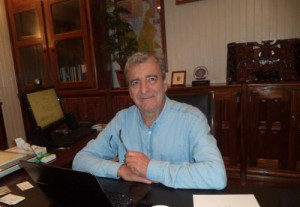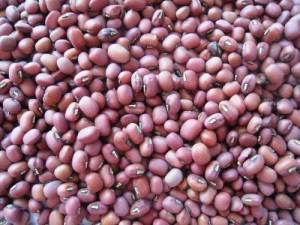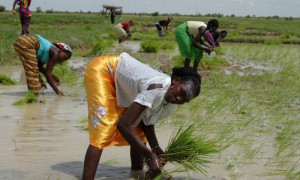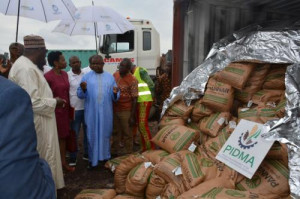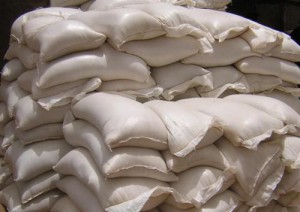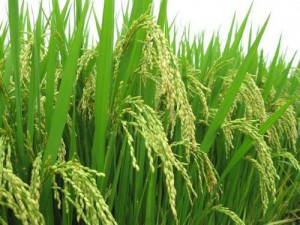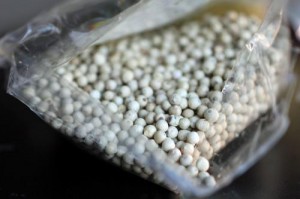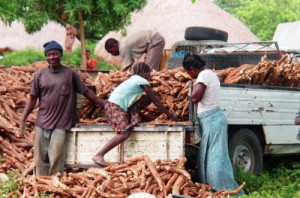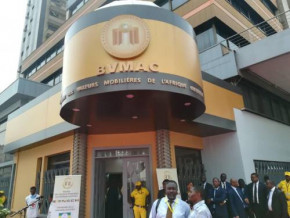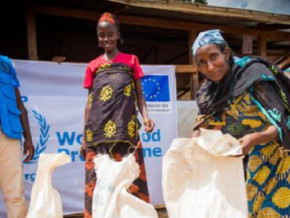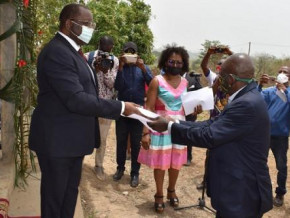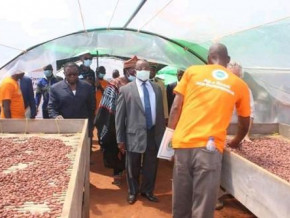
Hévécam to allow the development of subsistence crops in its farms
On March 16, 2018, Cameroon’s minister of agriculture and rural development Henri Eyébé Ayissi signed a partnership convention with Eric Hocepied, the managing director of Hévéa du Cameroun (Hévécam). The goal of this partnership which was signed in Niété is to allow the development of subsistence crops in farms belonging to Hévéa.
According to the two parties, thanks to this project, the food safety of residents in the company’s farms will be assured and decent jobs will be created.
Let’s note that the agribusiness company led by Sinochem International is one of the three natural rubber producers in Cameroon.
BRM
Cameroon: SOWEDA distributed 105,000 tons of enhanced seeds to producers in the Southwest in 2017
In 2017, the Southwest Development Authority (Soweda), distributed 105,000 tons of enhanced seeds of corn, beans and yam to producers of the Southwest region.
According to credible sources, 70,000 tons of corn seeds, 20,000 tons of bean seeds and 15,000 tons of yam seeds were distributed.
Let’s note that these seeds are the results of a programme launched by SOWEDA in 2014 to increase enhanced seeds. Thanks to this program, 24 seed farms were set in the Southwest and according to SOWEDA, 63 producer groups (with a total of 70,000 members) have already used the seeds.
BRM
Cameroon: About 4,000 additional hectares of rice plots arranged in the Far-North
About 4,000 additional hectares of lands have been rehabilitated for rice-production in the Far-North region. This was revealed by Marc Samantana, managing director of Société d’expansion et de modernisation de la riziculture de Yagoua (SEMRY).
“You know that at least 4,000 families can use two thousand hectares. When you multiply this by ten, you can notice that we are saving many residents from famine”, he said.
For the record, these lands were rehabilitated in the framework of the flood prevention urgency plan PULCI, implemented in the Far-North by Cameroon, with World Bank’s financial support.
In the framework of PULCI, infrastructures such as dikes and irrigation equipment will be constructed in the rice plots.
BRM
Cameroon: AIMPD to distribute 1000 tons of hybrid corn seeds to improve production in 2018
On March 9, 2018, Thomas Ngué Bissa, coordinator of AIMPD received 500 tons of yellow (Pannar 12) and white (Pannar 53) hybrid corn seeds in Douala.
According to official sources, this is the first part of an order of 1000 tons. The second part should be delivered in April. AIMPD officials reveal that the seeds will be distributed to producers in the 10 regions of Cameroon to ensure the availability of quality seeds for a successful 2018 campaign.
Thanks to these seeds, farmers can produce at least 4 tons of corn per hectare while with the variety they currently use, they can only produce 2 tons per hectare. AIMPD thus expects to increase the production by 160,000 tons this year.
By selling the products at CFA150/kg (it can be CFA250 during some seasons of the year, editor’s note), farmers can generate CFA24 billion.
The AIMPD explains that these seeds will be distributed to corn producers cooperatives but the other producers can request them if they have already prepared a site for the production.
These producers can send written requests to AIMPD’s regional units in Yaoundé, Douala, Bafoussam, and Garoua or to the representation of the agriculture ministry in their region.
To ensure that the seeds are well used, the institution informs that it will multiply its agricultural counseling to the beneficiaries, from when they receive the seeds to the day they sell the harvest.
A joint initiative of Cameroon and World Bank, AIMPD aims at boosting productivity and competitiveness in the value chain of corn, cassava, and sorghum. It is also aimed at increasing the production to meet the demands expressed by agribusiness companies.
Brice R. Mbodiam
Cameroon : 32 tons of millet seized in the far-north haunted by famine
On February 8, 2018, agents of the regional delegation of the ministry of commerce in the Far-North seized 32 tons of millet a truck was about to smuggle in Douala while the region is haunted by famine.
According to the regional tri-weekly L’œil du Sahel, all the load has been sold by the regional delegation at CFA18,000 per bag of 100 kg, while the actual market value is CFA25,000. This was a real opportunity for the population which is now unable to buy cereals because their staple foods production has been decreasing for at least two years now.
Officially, the decrease is due to the unfavorable climatic conditions and Boko Haram whose exactions forced many people to flee their villages and abandon the millet, corn and sorghum fields.
BRM
Cameroon: NCCB promotes the local consumption of processed cocoa
On February 9, 2018, in a hotel in Yaoundé, the French chocolate maker Alexandre Bellion led a tasting session intended for Cameroonian cocoa producers in order to promote the local consumption of processed beans.
During this session organized by the coffee-cocoa board, participants were able to learn more about the characteristics of the beans produced in the country’s various production basin. They also discovered the flavors and the organoleptic properties of cocoa produced in the centers of excellence which have been recently created. Finally, they were able to educate the consumers on Cameroon’s cocoa exceptional properties.
“Our country has chosen to join the very elitist category of premium cocoa producers and my ministry department wants to actively participate in this dynamic by constantly researching the best opportunities for Cameroon’s products. Today, our bean is being tasted in Yaoundé. Tomorrow, it will be in Amsterdam and Holland. After that, it will be in Washington in the United States”, said Luc Magloire Atangana, the minister of commerce who took part in this session.
Cameroon: An additional 7000 ha to be developed in the Northwest in 2018
This year, the Autorité de développement de la Haute vallée du Noun (UNVDA) wants to develop an additional 7,000 hectares of rice field, reveals Francis Fonayi Waindim, the institution's exploitation and operations development manager.
The project comes after government provided UNVDA about CFA890 million in 2017 to renew its equipment.
With this extension, the 14,000 producers supported by UNVDA could produce
more than the 1,400 tons produced in 2017.
BRM
Penja pepper and Cameroon’s coffee conquer the South African market
The participation of Cameroon’s economic operators in Durban fair in South Africa from September 25 to October 1, 2017, has started to yield results.
Indeed, during the fair, some South African partners have signed a contract to be supplied with Penja pepper. This was revealed on January 25, 2018, during a ceremony of presentation of New Year’s wishes to Luc Magloire Mbarga Atangana, the minister of commerce, in Yaoundé, Achille Bassilékin, secretary general at this ministry.
During that same fair, TORRECAM, the Cameroonian coffee roaster has obtained the firm promise of another South African partner, whose name has not been disclosed, to distribute Cameroon’s coffee in that country with 55 million consumers.
BRM
Cameroon: SNS wants to be the leader in coffee processing in the country
Cameroon’s ministry of economy has agreed to support Synergie Nord Sud (SNS), based in Nkongsamba in the coastal region, in the modernization of its production machinery.
The ministry wants to help SNS buy a more efficient torrefaction unit which will multiply its production capacity four folds. According to Aimé Njiakin, sponsor of SNS, this will make the company the leader in coffee processing in Cameroon. The goal is to process 7,000 tons of coffee per year within 3 years and, it will also generate about 500 direct jobs and 6,600 indirect jobs.
So far, the main activity of SNS is shelling and processing of raw coffee in decaffeinated water-soluble ground roasted coffee in capsule under the brand “Ménage à trois”. In 2016, the company has produced 1,510 tons of husk coffee, 1,750 tons of processed coffee and 450 tons of roasted coffee. During the period under review, the company generated CFA491 million turnover.
From 4-11 July 2016, Ménage à trois was the only Cameroonian coffee brand to be tasted in France at the headquarter of Agence pour la valorisation des produits agricoles especially.
S.A
A cassava production agropole launched in Atok
An agropole of cassava production, processing and commercialization has been launched in Atok, in East Cameroon. It has been launched by Cameroon’s ministry of economy in the framework of the agropole projects that it oversees.
Thanks to funds from government, this project initiated by women’s organizations aimed to increase the annual cassava production from 178 tons to 6,280 tons. According to them, this will help produce about 3,500 tons of cassava flour.
Lets’ note that through the agropole projects initiated some years ago, Cameroon’s government wants to create income-generating activities in rural zones and boost national production in order to reduce food products’ imports.
BRM
Mags frontpage
- Most read 7 days
- shared 1 month
- read 1 month


